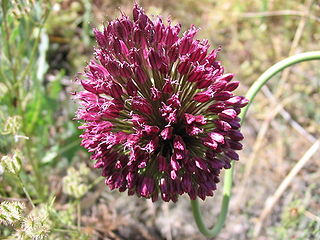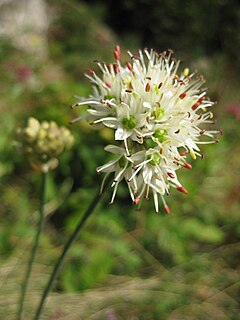The scientific name Allium montanum has been used for at least six different species of Allium.

Allium sphaerocephalon is a plant species in the Amaryllis family known as round-headed leek and also round-headed garlic, ball-head onion, and other variations on these names. Other names include Drumsticks, and in Germany, Kugellauch. Some publications use the alternate spelling A. sphaerocephalum. It is a hardy perennial plant.

Allium moly, also known as yellow garlic, golden garlic and lily leek, Is a species of flowering plant in the genus Allium, which also includes the flowering and culinary onions and garlic. A bulbous herbaceous perennial from the Mediterranean, it is edible and also used as a medicinal and ornamental plant.

Galium glaucum or waxy bedstraw is a plant species of the Rubiaceae. It is native to central Europe from Portugal to Ukraine, and sparingly naturalized in a few locations in North America.

A crop wild relative (CWR) is a wild plant closely related to a domesticated plant. It may be a wild ancestor of the domesticated (cultivated) plant, or another closely related taxon.

Allium tuncelianum is a species of wild onion which is endemic to the Munzur Valley in Tunceli, in eastern Turkey. It has a garlic odor and taste and is used locally like garlic. Its common names include Tunceli garlic and Ovacik garlic. Botanists have suggested this species may be a close relative of garlic, and perhaps an ancestor of garlic, but genetic analysis shows that it is actually more closely related to leek. The plant is collected from the wild for use in cooking, a phenomenon that threatens the plant with extinction.

Hohenkrähen is a mountain in Baden-Württemberg, Germany.

Allium roseum, commonly called rosy garlic, is an edible, Old World species of wild garlic. It is native to the Mediterranean region and nearby areas, with a natural range extending from Portugal and Morocco to Turkey and the Palestine region. It is cultivated widely, and has become naturalised in scattered locations in other regions outside its natural range.

Allium senescens, commonly called aging chive, German garlic, or broadleaf chives, is a species of flowering plant in the genus Allium.

Van herbed cheese is a type of cheese made out of sheep's or cow's milk. Ripened cheese varieties containing herbs are traditional in Turkey and have been manufactured for more than 200 years in the east and southeast of the country. They are manufactured from raw milk, semi-hard in texture and salty in taste and have the aroma of garlic or thyme due to added herbs. Twenty-five types of herb, including Allium, Thymus, Silene and Ferula species which are most popular, are used individually or as appropriate mixtures. The most popular of these cheeses is Otlu which is produced mainly in the Van Province of Turkey in small dairies and villages, but now is produced in other cities of the eastern region of Turkey and its popularity increases continuously throughout Turkey.

The flora of Lebanon includes approximately 2,600 plant species. Situated on the eastern coast of the Mediterranean Basin, Lebanon is a reservoir of plant diversity and one of the world's biodiversity hotspots for conservation priorities. Endemic species constitute 12% of the Lebanese flora; 221 plant species are broad endemics and 90 are narrow endemics. Important Plant Areas (IPAs) featuring the country exceptional botanical richness were defined in 2018.

Allium carinatum, the keeled garlic or witch's garlic, is a perennial plant up to 60 cm tall. It is widespread across central and southern Europe, with some populations in Asiatic Turkey. It is cultivated in many places as an ornamental and also for its potently aromatic bulbs used as a food flavoring.

Allium ericetorum is a species of onions widespread across much of southern and central Europe, from Portugal to Ukraine.

Allium flavum, the small yellow onion or yellow-flowered garlic, is a species of flowering plant in the genus Allium, which also includes the flowering and culinary onions and garlic. A bulbous herbaceous perennial, it is native to the lands surrounding the Mediterranean, Black, and Caspian Seas, from France + Morocco to Iran + Kazakhstan.

Allium lusitanicum is a plant species widespread over much of Europe, mostly in mountainous regions. It has been reported from every country on the continent from Portugal to Ukraine except Iceland, Ireland, the United Kingdom, Netherlands, Belgium, Luxembourg, Denmark, Finland, Albania and Greece.

Allium pallens is a species of wild onion native to the Mediterranean region and Middle East from Portugal and Algeria to Iran.

Allium trifoliatum, commonly called pink garlic and Hirsute garlic, is a Mediterranean species of wild onion. It is native to France, Cyprus, Malta, Italy, Greece, Egypt, Turkey, Lebanon, Palestine, and Israel.

Allium subhirsutum, the hairy garlic, is a plant species widespread around the Mediterranean region from Spain and the Canary Islands to Turkey and Palestine.

Allium guttatum, spotted garlic, is a species of wild garlic native to Morocco, Algeria, Tunisia, Libya, Portugal, Spain, France, Italy, Sardinia, Sicily, the Balkan Peninsula, the Aegean Islands, Turkey, Cyprus, Romania, and Ukraine. Described in 1809, by 1819 it was being cultivated in British gardens as an ornamental.
Hieracium senescens is a species of flowering plant belonging to the family Asteraceae.


















